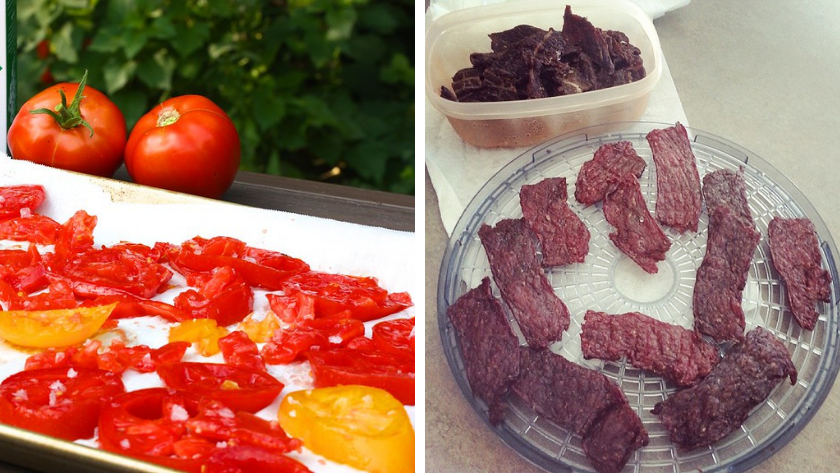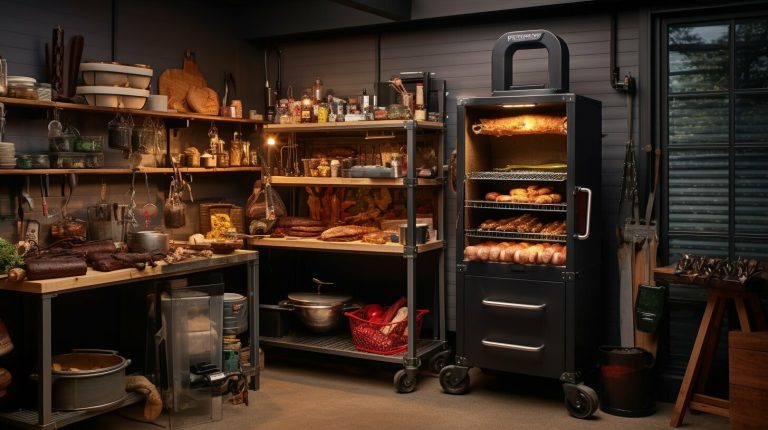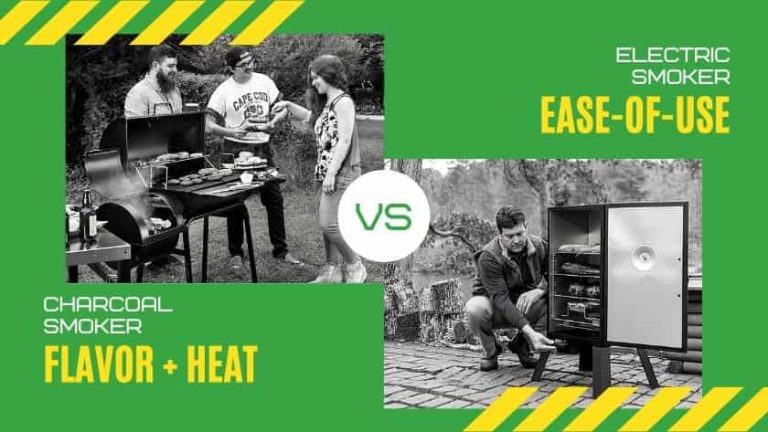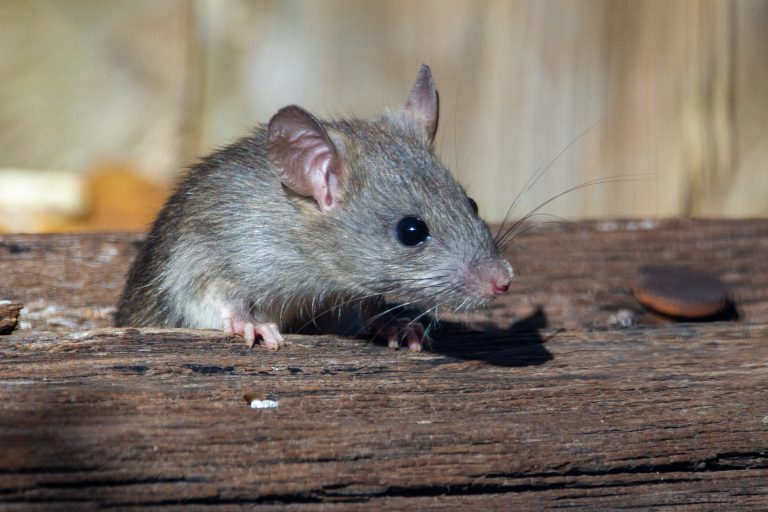Food Smoker VS Dehydrator: What Is The Difference?
When it comes to food preservation there are several ways to contain and store your products for future use but there has been some long-lasting debate on whether or not using a food smoker or dehydrator is plausible and which of the two would be the better option.
People often confuse them for each other as they both do the same thing but in different ways.
Although both appliances are very different and the food smoker is mainly used for cooking and grilling, they both share the main commonality of removing moisture and water from foods to stop the growth of bacteria that causes food to go bad in a short period.
The reason for this is to increase shelf life and reduce waste whether you use the smoking method or a dehydrator.
A food smoker improves the taste of food products while extending its shelf life and a dehydrator removes natural water stored in food to extend its shelf life, but in doing so, potentially reduces the taste of food products.
In this article, you will receive thorough details on both appliances, what they do, the difference between them, and additional information to aid in the process of deciding which appliance is the best one for you to use.
What Is A Dehydrator?
A dehydrator is a convention oven appliance that uses hot air to remove water and moisture from foods to preserve them for future use.
If you’ve ever had or heard of dried fruits, this is the process that is undergone to achieve those results. But fruits aren’t the only food items that can be dried.
A dehydrator can be used to preserve vegetables and meats as well.
The appliance uses heated airflow to decrease the percentage of water that is naturally developed in food products, which is usually 80 to 95% in fruits and vegetables and 50 to 75% in some meats.
What Is A Food Smoker?
There is not a specific appliance for the sole purpose of smoking and preserving food but the smoking technique can be done using a smoke oven or by adapting an ordinary barbecue grill.
Smokers work by circulating heat through a smoking chamber. The heat is mixed with water to create steam that cooks food but the temperature can be increased to create smoke that dries food like meat and nuts.
A food smoker mainly conserves the taste and flavor of food products and be combined with hurdles like chilling and packaging to extend shelf life.
The Difference Between Smoker & Dehydrator
Purpose
A smoker can be used for several purposes, one of which is the sole purpose of using a dehydrator.
A smoker is used to cook foods like meat and fish, increasing their taste by adding flavor on smoking grills but in food processing, it can be used for food reservation through the drying process using smoke and additional actions like chilling and packaging as mentioned earlier.
The purpose of a dehydrator is to dehydrate foods to preserve them for future consumption, like as snacks.
Both appliances are considered and used for drying because removing water from foods destabilizes certain bacteria and prevents them from growing and spoiling food.
Food preservation, regardless of personal reasoning, is sustainable and beneficial for the environment.
How They Work
As for how both appliances work, a dehydrator is much more precise and simpler to use. They need heating sources such as solar energy, electric power, and biofuel to operate at full capacity.
Its heating elements, fans, and vents all work together to direct hot air over the food, increase the process of water evaporation on the surface and warm the food which causes moisture to be released from the inside of the food.
This is continued until the food contains a water percentage of 20% or less and is completely dried.
A food smoker’s workings are a bit more complex. Chemicals found in smoke, like formaldehyde and alcohol act as preservatives in the process of smoking and drying foods.
Because the food becomes dry, there is limited moisture which gives bacteria room to grow resulting in the spoiling of food. Cold smoking involves fermenting, curing, and salting food before the smoking process, with the same result of the food becoming dry.
The process of smoking food until dried also helps to retain the flavor and taste of foods like meat.
Limitations
Like anything, there are some limitations to using both appliances. With the food smoker, foods like meats (pork, beef, ham, etc.), fish (herring, salmon, etc.), and other poultry and nuts can be preserved.
But with a dehydrator, foods like fruits, vegetables, and some meats can be preserved. Alongside that list is one that includes food that cannot or should not be dehydrated.
Those foods are avocados, olives, fatty meats, milk products like cheese, eggs, nuts, leafy greens, mushrooms, and some fruits like bananas, pears, and apples.
Using the dehydrator comes with the risk of also losing the flavor and taste of foods which may only be a problem for some people.
Application and Features
A dehydrator is an actual appliance, usually, a low-power convection oven that consists of a heating element (a part that converts electrical energy into heat through the process of Joule heating), an electric fan (a powered machine used to create airflow), air vents (for circulation) and food trays to place food onto.
There are different types of food smokers which are also considered grills or smoke ovens. Some smokers are water-based and others are dry but they all contain the main parts for food and the release of smoke.
A water smoker has a cylindrical barrel (precisely 2 1/2 to 3 1/2 feet high and 18 inches wide).
A base that acts as the source of heat for either charcoal, gas, or electricity, wood chips to place above the heat source, a water pan that goes above that and most importantly, a grill rack to place the food that will be smoked for cooking or drying.
As for dry smokers, they operate indirectly. They consist of two chambers, a large one for placing food and a smaller one for where the fuel source (charcoal, gas, or electricity) heats the food indirectly.
All smokers are outdoor grills that possess lids for covering food to speed the process along and legs with wheels that allow for easy movement and storing neatly in corners.
Cost
Considering the cost is crucial for any purchase made, especially when it comes to purchasing an item that will be used to handle something as delicate as food.
Food smokers are multi-purposeful and come in different shapes and sizes.
They range from being sold for as low as $50 to as high as $10,000 plus. It may be wiser to acquire a small water smoker, which may take longer to achieve the result of drying food but is much more cost-effective.
The cost of a food dehydrator is more reasonable. They can go from $50 to $500 or more depending on the size, features, and where you purchase them.
Time and Temperature
Foods should be dehydrated at 135 to 145 degrees Fahrenheit using a dehydrator.
For certain fruits like apples, bananas, peaches, and nectarines, drying time ranges between 6 to 16 hours but for others foods like figs, apricots, and pears the time can range for much longer, like between 20 to 36 hours.
As for using a food smoker, Because it is also a grill, the temperature and times vary on a much larger scale due to the different meats and other foods that can be dried for preservation using this appliance.
Temperatures for smoking food range from 210 to 240 degrees Fahrenheit and the entire process can last anywhere between 45 minutes to 20 hours.
Be sure to double-check the specific temperature and time for the foods you decide to smoke for preservation.
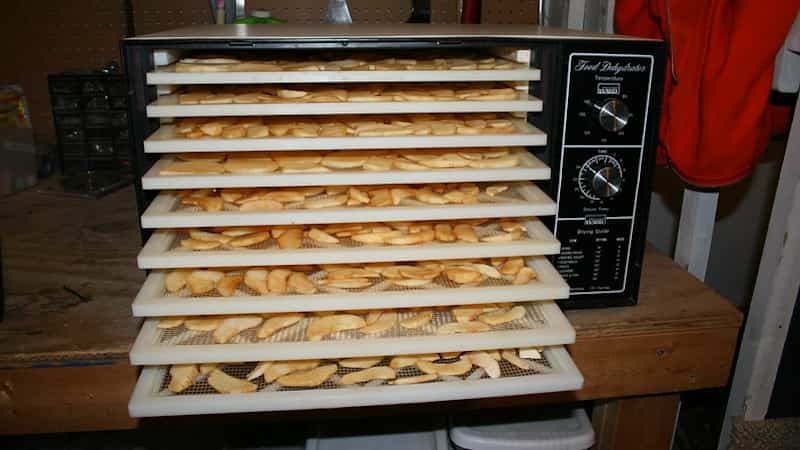
Advantages Of A Dehydrator
Here are some of the general and health benefits or advantages of using a dehydrator:
1. Great taste
By removing the moisture from fresh and high-quality fruits yourself, a natural concentration of taste is kept even after the drying process.
You also have the luxury of knowing how good it tastes by preserving your foods instead of purchasing them from grocery stores and delis.
2. Reduce food waste and extend shelf life
By drying and preserving food, they last longer in your home and are readily made for quick consumption. Because there is less food to go bad there is minimal waste, making for a more sustainable food habit and lifestyle.
3. Creates healthy, natural food
Only one ingredient is used in this process and unlike cooking and steaming, none of the nutritional contents in the foods are lost when dehydrated.
So the quality remains the same while the value increases by lasting longer in storage.
4. Cost friendly
Processed snacks sold in stores, along with anything healthy and organic are usually very pricey. BY making a one-time purchase investment on a dehydrator you can save lots of money drying and preserving your foods.
5. Efficient Storing and power saving
Dried foods tend to decrease in size which means they don’t occupy as much space as they originally did. This way, power can also be saved by not having to store them in electric coolers or freezers anymore.
They can be packaged in reusable bags or glass containers and stored on shelves safely and for much longer.
6. Portable
Dried foods are easier to remove and travel with, not adding any or much weight to bags at all.
7. Precision
There are other ways that people attempt to dry food with, like in a conventional oven but by using dehydrators which are made for this purpose, you get precisely dried and preserved foods without the countless trial and error and frustration of using a DIY alternative.
8. Versatility
You have the option to make different snacks with dried foods, like veggie chips, fruit roll-ups, jerky and more. Drying your food at home doesn’t have to be boring.
9. Easy to use
This appliance is fool-proof, the instructions are not plentiful or confusing and even if you are drying food that takes a lot of hours or even a day, it is safe to forget and return without worrying about any complications.
This does not mean that you should skip reading manuals or instructions before usage.
10. Safe preservation
Water is removed in the process of drying foods with this appliance so there is low to no risk of any bacteria growing in foods that would cause it to spoil.
The safety of dehydration is so compelling that hikers, campers, and astronauts count on dried foods for nourishment.

Advantages Of A Food Smoker
Food smoking is more complicated, as this process is not only used for food preservation but also for cooking. Nonetheless, there are advantages to using a food smoker, which include:
1. Food safety
The drying process via a smoker kills certain bacteria and slows the growth of others, resulting in food lasting longer and being safer to consume.
2. Extended shelf life
Due to the evaporation of moisture in foods, bacteria cannot grow to cause spoilage, thus extending the shelf life of food for future consumption.
3. Great taste
Smoking enhances the flavor and smell of food by providing the option to add more taste to the foods in the smoker during the process. This makes dried food more appetizing.
4.Same advantages as dehydrating
This process also offers some of the same advantages of dehydrating food, like easy usage, versatility, portability, efficient storage, and waste reduction.
Can A Smoker Be Used As A Dehydrator?
You may be wondering since both appliances can issue the same result if a smoker can be used as a dehydrator and the short answer to that question is yes, but it requires you to pay much more attention to temperatures.
Keeping them low enough to achieve the result of drying foods like meats. Even though you can dehydrate foods with a food smoker, you can only use certain foods with this appliance.
A dehydrator is made for this sole purpose so ultimately it is easier to maintain and use.
Its only fuel source is electricity that gets converted into heat and there is no need to change wood, charcoal, or any other additional elements needed to operate it.
Choosing The Right Appliance For Your Need
In conclusion, both appliances can be used for the same result but may not share the same kind of quality.
When it comes to choosing the right appliance for your need, it is important to consider the foods you want to be dried and preserved as foods like nuts may not contain enough water for a dehydrator like an apricot would.
We hope that with this information and any other personal research you are recommended to conduct, your decision-making process is as smooth as the process of living a more sustainable life through food preservation.
Related Post To Consider
Are Broil King Grills Any Good? Know This Before Buying!
11 Best Pellet Grill And Smoker Brands for 2022
